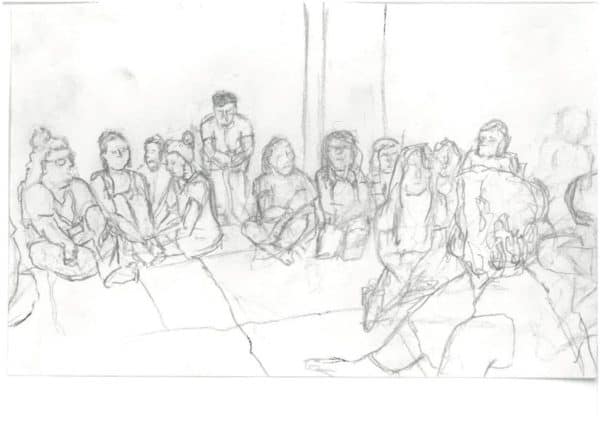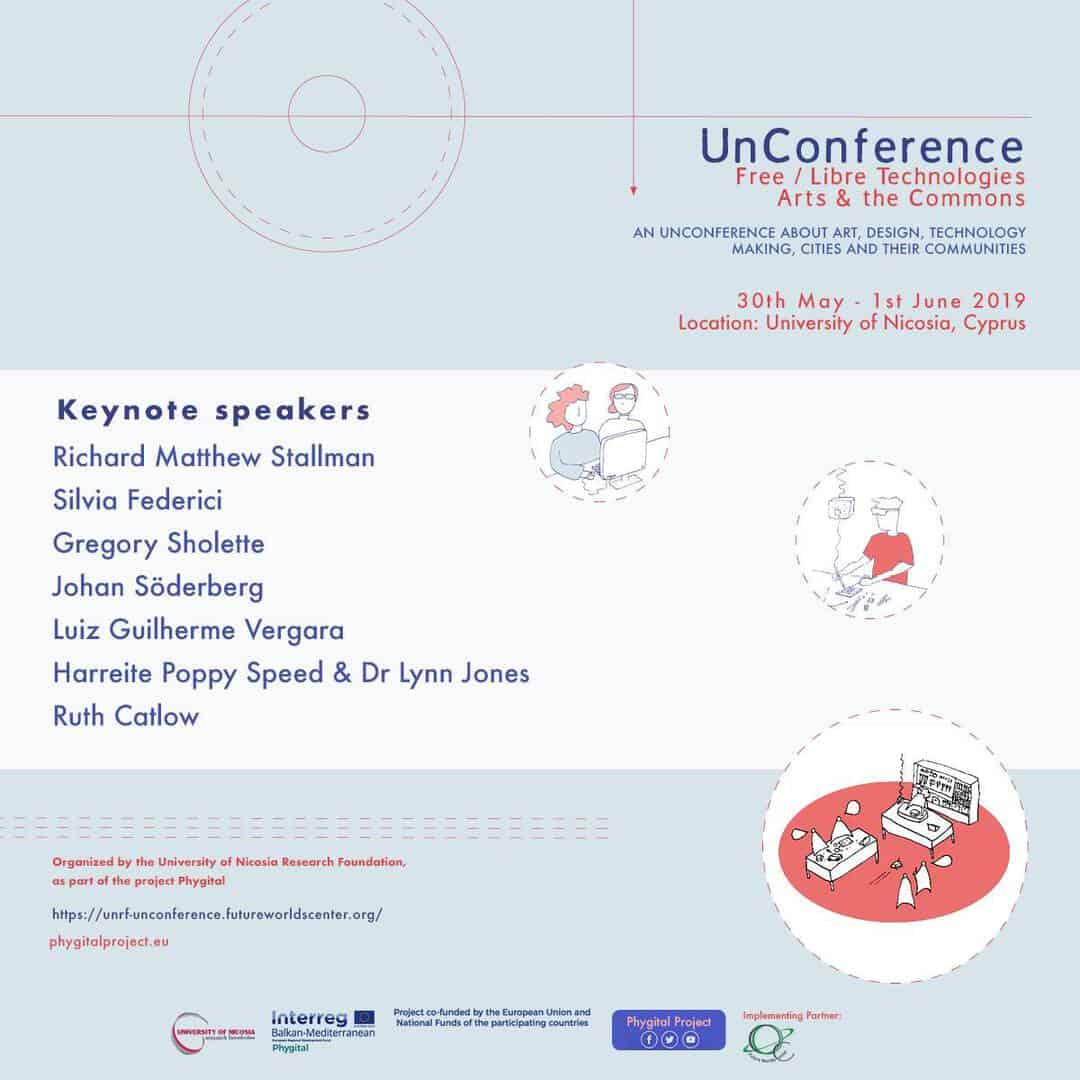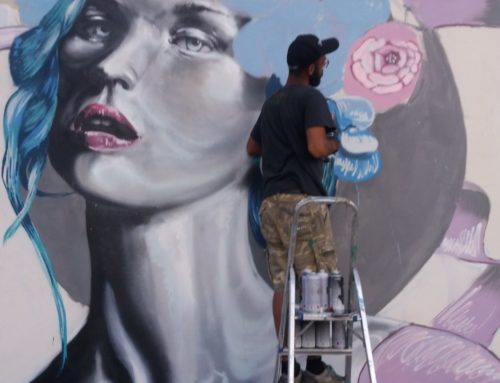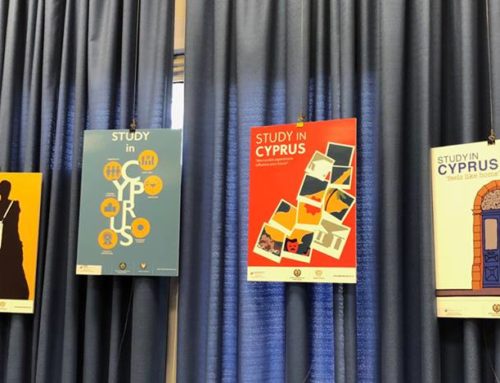Phygital Unconference – Free/Libre Technologies, Arts and the Commons
University of Nicosia Research Foundation
https://unrf-unconference.futureworldscenter.org/

Unconference Drawing by Elisha Cox, 1st of June 2019
More than a hundred people took part in the Unconference Free/Libre Technologies, Arts and the Commons, part of the project Phygital, that took place from Thursday, May 30th until Saturday, June 1st 2019 at the University of Nicosia in Cyprus. It was organized by the University of Nicosia Research Foundation as part of the project Phygital, and co-organized in collaboration with the local partner Lakatamia Municipality, the Fine Art Programme, Department of Design and Multimedia, University of Nicosia and hack66. The implementation partner is Future Worlds Centre.
On the 30th and 31st of May the Unconference programme included presentations by 8 invited speakers:
Copyright vs Community in the Age of Computer Networks
Professor Richard Matthew Stallman
Mutiny, Mutualism and Complicity in a “Bare” Art World
Professor Gregory Sholette, Queens College, City University of New York
Micro-geographies of Grassroots Collective Action. Tripartite Ethical Unity of Art
Professor Luiz Guilherme Vergara, Federal Fluminense University (UFF)
Intersectional Feminism and Fact – Women’s Experience in Practical Workshops
Harriet Poppy Speed and Dr Lynn Jones
Decentralisation and Commoning the Arts
Ruth Catlow, Furtherfield London
Into the Red Stack: Chinese digital media between platform protectionism and infrastructural sovereignty
Dr Gabriele de Seta
Hacking hacked: The struggle over recuperation as a source of innovation
Johan Söderberg, University of Gothenburg
The politics of the commons
Professor Silvia Federici
As well as presentation by many other distinguished speakers that were selected by a scientific committee through an open call: Eva Korae, Jenny Dunn, Natalia Avlona, Federica Matelli, George Themistokleous, Rose Butler, Selena Savić, Alex Pazaitis, Tom Keene, Blanca Jove Alcalde, Theopisti Stylianou-Lambert, Georgios Artopoulos, Ioanna Hadjicosti, Antigone Heraclidou, Marinos Koutsomichalis, Maria Shehade, Evanthia Tselika, Theodotos Andreou, Vasilis Ververis, Despoina Mitropoulou and Theodoros Karounos
Unconference Format
This Unconference followed the momentum of a broader movement rethinking the academic conference format towards a more connected model of knowledge sharing, peer learning and collaboration. This allowed for presentations of research as well as also allowing participants to work together and set their own agenda in discussions, workshops, and co-working sessions, that respond to previous proposals as well as spontaneously emerging priorities. We hosted participants from a broad network of researchers and activists across fields.
On the 1st of June the Unconference programme included a General Assembly and parallel clusters which were shaped by participant suggestions both during the 30th and 31st of May but also through the morning General Assembly. The six clusters worked throughout the day and the Unconference concluded with a General Assembly where the clusters shared what they discussed throughout the day.
Parallel Clusters:
Todo Cambia School
Art Revealing Spreadsheet as Organisational Form
Challenges of Synthesis: Art, Tech and Commons
Direct Democracy Electronic Voting System
Free your Tech- Internet Control and Transparency
Community, Society, Anonymity, Cultural Practices
We now look forward to the shaping and publishing of the Unconference Proceedings.
The Unconference Concept which the presenters and clusters initially responded to:
What kind of creativity comes after today’s digital cultures? After the smart city, post-surveillance, post-innovation, when social entrepreneurship discourse has ran its course?
In the last few years there has been a sharp momentum in the growth of groups and spaces that operate under collective and community-driven structures of collaboration and shared learning processes (onsite and online). This is happening in parallel to debates about the fate of the commons (physical, digital, and creative), and about openness and freedom of access. Our societies are at the same time, reeling from the effects of connectivity and social media just as we try to understand their potential and limitations for civic improvement, mobilization and/or abuse, and their extensions into socially and community orientated art and design.
In our times of digital communalities, bringing together issues related to art, design, technology, governance, and the commons, also means to reflect on contemporary discourses of openness and freedom, and to redefine the ways we produce and share knowledge, not least about new possibilities of production and sharing in themselves.
Considering our digital realisms and increasingly disparate lived realities, we wish to explore examples and approaches to activism in relation to social movements around making and sharing, critical artistic practices, and their related technological shifts. Especially as pockets of our cities are being transformed into creative and entrepreneurial hubs, and new setups of collective knowledge production blend into processes of urbanisation, regeneration and issues related to the smart city and its mechanisms of surveillance.
Unconference Scientific Committee
Evanthia Tselika, University of Nicosia. (Chair)
Chrystalleni Loizidou, hack66/ Lakatamia Municipality. (Chair)
Helene Black, NeMe.org.
Yiannis Colakides, NeMe.org.
Maria Hadjimichael, University of Cyprus.
Marios Isaakidis, University College London.
Eva Korae, Cyprus University of Technology.
Thrasos Nerantzis, Future Worlds Centre.
Leandros Savvides, Leicester University.
Gabriele de Seta, Institute of Ethnology, Academia Sinica in Taipei, Taiwan.
Niki Sioki, University of Nicosia.





